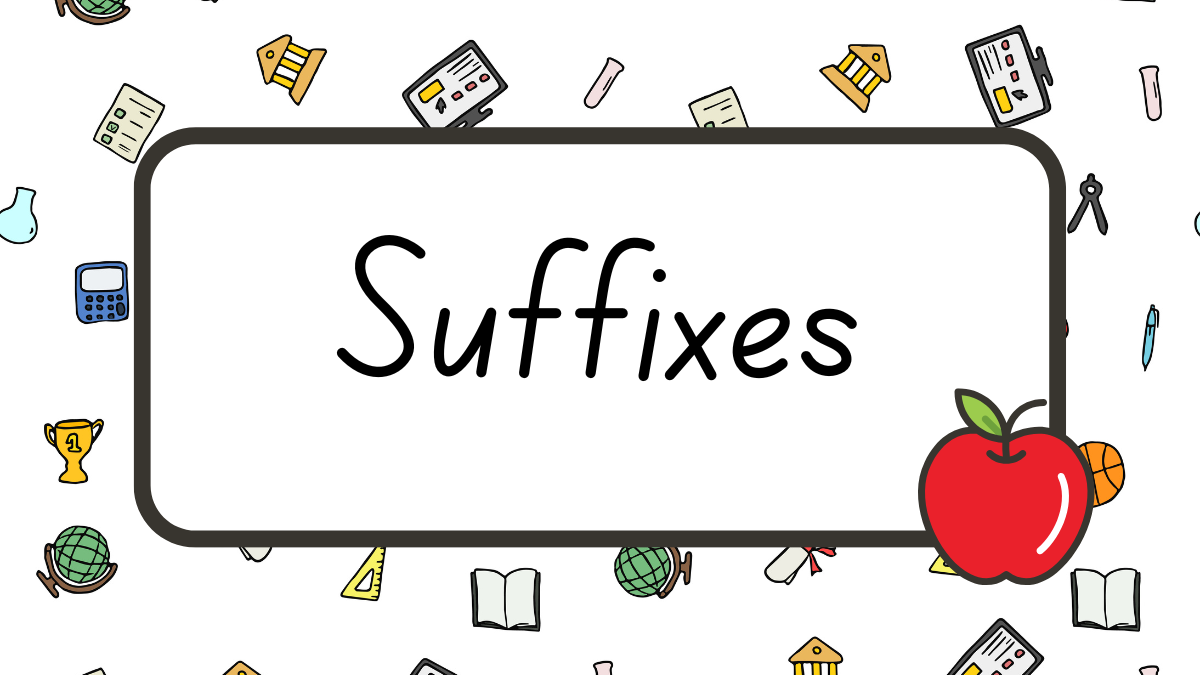Nouns with Suffixes: Guide for English Learners
In English, suffixes play a major role in word formation. One of the most common uses of suffixes is to form nouns. Understanding how suffixes work can help expand your vocabulary and improve both writing and speaking skills.
What Are Suffixes?
A suffix is a group of letters added at the end of a word to change its form or meaning. When we add suffixes to a base word, we can change it into a noun.
Common Noun Suffixes
Below are some of the most popular suffixes used to form nouns:
| Suffix | Meaning | Examples |
|---|---|---|
| -er / -or | A person who does something | teacher, actor, singer |
| -ist | A person involved in a profession or belief | artist, pianist, scientist |
| -ness | A state or quality | happiness, darkness, kindness |
| -tion / -sion | The action or result of something | celebration, decision, discussion |
| -ment | The process or result | development, punishment, agreement |
| -ity / -ty | The quality or condition | honesty, activity, reality |
| -ship | Position or state | friendship, leadership, relationship |
| -ance / -ence | State or quality | importance, confidence, silence |
| -al | The act or process of something | refusal, arrival, renewal |
| -dom | Domain, state, or condition | freedom, kingdom, wisdom |
Examples
Here are 20 examples of nouns with suffixes
- Kind → Kindness (-ness)
- Decide → Decision (-sion)
- Happy → Happiness (-ness)
- Develop → Development (-ment)
- Act → Actor (-or)
- Friend → Friendship (-ship)
- Lead → Leader (-er)
- Create → Creation (-tion)
- Free → Freedom (-dom)
- Honest → Honesty (-y)
- Relate → Relation (-ion)
- Arrive → Arrival (-al)
- Govern → Government (-ment)
- Enjoy → Enjoyment (-ment)
- Art → Artist (-ist)
- Science → Scientist (-ist)
- Move → Movement (-ment)
- Ignore → Ignorance (-ance)
- True → Truth (-th)
- Renew → Renewal (-al)
Why Learn Noun Suffixes?
Learning how suffixes work will help you:
- Build vocabulary faster
- Identify word meanings more easily
- Form related words for writing and speaking
- Improve comprehension of academic and formal texts
Root Words and Derivatives
Suffixes don’t just create nouns — they help form word families. For example:
- Root: Act
- Noun: action, actor, actress
- Verb: act
- Adjective: active
Understanding how nouns fit into a word family can help with grammar, spelling, and sentence formation. It also makes learning English more intuitive and interconnected.
Suffixes in Other Word Forms
While this post focuses on nouns, it’s good to remember that suffix can also form adjectives, verbs, and adverbs. For instance:
- -ful (beautiful)
- -less (hopeless)
- -ize (realize)
- -ly (quickly)
Recognizing suffixes as part of a larger system helps build a deeper understanding of English word structure.
1. What is a noun suffix?
A noun suffix is a letter or group of letters added to a base word that transforms it into a noun. For example, “develop” becomes “development.”
2. Can a word have more than one suffix?
Yes, some complex words can have more than one suffix, though it’s less common. Example: “nationalization” has -al, -ize, and -tion.
3. Are all words ending in these suffix nouns?
Mostly yes, but context matters. For example, “run” can be a verb or a noun depending on use, and not all “-er” endings are nouns.
4. How do I know which suffix to use?
There’s no fixed rule, but learning patterns through examples is helpful. Over time, you’ll recognize which suffix fits based on meaning and usage.
5. Can suffix change spelling of the base word?
Sometimes, yes. For example:
- “happy” → “happiness” (y → i)
- “create” → “creation” (e dropped)







